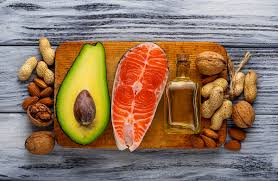It’s crucial to understand that not all fats are created equal. Contrary to popular belief, fat is not inherently bad. It plays a vital role in our health. It can aid in weight loss, protect against heart disease, facilitate vitamin absorption, and bolster our immune system. The key lies in knowing which fats to include in our diet and which ones to avoid.
Saturated fat These fats have the worst reputation and are found in animal fats and coconut oil. Here’s the controversial bit because it goes entirely against what we have been told for decades (and government agencies are still telling us) … these saturated fats that you eat – the dietary saturated fats – don’t raise cholesterol. The fats that are ‘bad’ are the trans fats, which cause cell membranes to become stiff and rigid and no longer function correctly. Trans fats harm cardiovascular health (lower good cholesterol and increase bad cholesterol). Some trans fats are contained naturally in dairy products, but particularly in processed foods (i.e. hydrogenated oils, margarine).
Monounsaturated fats, A cornerstone of the Mediterranean diet, are particularly beneficial. Olive oil, a prime example, is rich in these fats. It’s no coincidence that populations with a high consumption of these fats, such as the people of Greece and Italy, boast some of the lowest rates of heart disease worldwide. Many cardiologists endorse the Mediterranean diet, citing its association with lower cholesterol levels.
You will probably know polyunsaturated fats as omega-3 and omega-6 – the essential fatty acids. ‘Essential’ relates to the fact that the body cannot make this kind of fat; you need to eat it as part of your diet – or take it as a supplement. They fulfil many roles in the body, and sufficient levels have implications for cell membranes, hormones (they regulate insulin function), managing inflammation and immunity, mood, and memory.
How did fat get such a bad name? Fat has a bad reputation. Over the last 70 years, low-fat products have been marketed as the saviour of our health. The message from governments and the media was—and essentially still is—that, when eaten, fat gets stored as fat in the body and puts us at greater risk of heart disease.
My favourite fat is AVOCADOS. They go with practically anything and are high in vitamin E and healthy monounsaturated fats. COCONUT OIL Apart from helping reduce bad cholesterol and blood pressure, coconut oil is an anti-fungal—the ideal replacement for butter in baking and as your oil when frying. NUTS Packed with nutrients like magnesium and vitamin E, nuts bring plenty of essential fats. OILY FISH are chock full of omega-3 fatty acids necessary for hormone balance. OLIVE OIL: Use cold-pressed organic oil as a salad dressing instead of cooking with it.
Cooking with fat: How the fat is used (through cooking and processing) is a big deciding factor in whether it is healthy or unhealthy. Essential fatty acids (EFAs) become free radicals in the presence of light, oxygen, and heat. That is because frying with oils like olive oil at high temperatures leads to oxidation and the production of free radicals—highly inflammatory for the body and may increase the risk of heart disease or cancer.
While this article provides a comprehensive overview, it’s important to note that individual dietary needs may vary. To delve deeper into these topics and receive tailored guidance on incorporating healthy fats into your diet, I’m offering a 30-minute consultation. Don’t hesitate to reach out and secure your slot today!
Let’s embrace fat as a vital component of our diets and prioritize our health for a brighter, healthier future.










